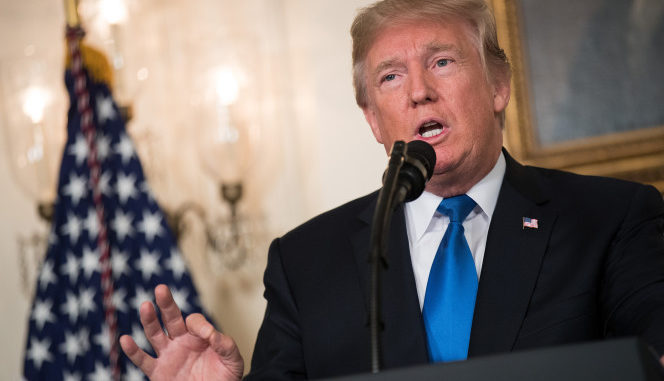
New York Post October 22, 2017: Defenders of the Iran nuclear deal have settled on a narrative. From high-ranking Democratic senators to European ambassadors to Iranian diplomats and newspaper editorial pages, the cry has gone out: Jeopardizing the nuke deal will harm American credibility abroad.
The truth, however, is nearly the exact opposite. President Trump’s decision to decertify the pact offers an opportunity to rebuild the credibility lost when President Barack Obama instituted his policy of appeasement of Iran and Russia. Here’s a history lesson for Democrats.
On July 8, 2008, then-Secretary of State Condoleezza Rice traveled to Prague and signed an executive agreement to base US missile-defense radar in the Czech Republic. One month later, she visited Warsaw to sign another agreement to base missile-defense interceptors in Poland. In both cases, the State Department declared the agreements “legally binding.”
The George W. Bush administration had long advanced the case for a global missile-defense network that could intercept future Iranian long-range ballistic missiles at multiple points. Putting bases in Poland and the Czech Republic was meant to send a clear message to Iran: We’ll defend our allies — successfully.
Russia didn’t see it that way. Moscow viewed the move as an American attempt to establish a permanent presence in its sphere of influence.
Vladimir Putin’s government threatened to respond with “military-technical methods” if the missile-defense pact moved forward. But, in the wake of Russia’s invasion of Georgia, the Bush administration didn’t back down. America projected strength to Iran and Russia at the same time, reassuring our allies in the Middle East and Eastern Europe.
Unfortunately, two signed American agreements once called “legally binding” didn’t survive Obama’s desire to rebalance American strategic priorities away from our Middle East and European allies.
In the summer of 2009, as Iranians poured into the streets of Tehran protesting an illegitimate theocracy, Obama stood by his offer of a “new beginning” with the regime “grounded in mutual respect.” Three months later, on the 70th anniversary of Russia’s invasion of Poland, the president tore up America’s missile-defense pacts with Poland and the Czech Republic, offering up our allies as a sacrifice to Putin in the hope of “resetting” US-Russia relations.
Then-Speaker Nancy Pelosi (D-Calif.) called Obama’s move “brilliant.” Then-Senate Armed Services Committee Chairman Carl Levin (D-Mich.) called it “a sound choice that will improve our security.”
Moscow and Tehran saw weakness. Russia began a years-long campaign to expand its sphere of influence. Iran accelerated its development of a nuclear-weapons capability.
By 2015, the Obama administration’s policy of appeasement culminated in one of the worst deals ever negotiated, the Joint Comprehensive Plan of Action: billions of dollars paid to the world’s leading state sponsor of terrorism and freedom for Iran to expand its missile programs and terrorist armies in exchange for a temporary delay in parts of Iran’s nuclear program and no foolproof way to verify the regime’s compliance.
America put its toughest economic and military tools in a lockbox, subjecting our country to indefinite nuclear blackmail from Tehran. And our enemies around the world, including North Korea, took note.
Now, after another change in White House party control, a first-year president is threatening to walk away from the Iran appeasement unless fundamental deficiencies are addressed. Yet the same Democrats who praised Obama’s decision in 2009 now warn America will demonstrate it can’t be trusted if Trump walks away from Obama’s Iran appeasement deal. They say they’ll never support forthcoming legislation from US Sens. Tom Cotton (R-Ark.) and Bob Corker (R-Tenn.) that would force changes to the JCPOA and pressure Iran to curb its illicit behavior.
Compared to ripping up a signed defense pact with key European allies, renegotiating an unsigned “plan of action” that currently threatens US national security sounds like a sensible idea.
Before rushing to condemn Trump’s attempt to “fix or nix” the Iran deal, Democrats on Capitol Hill ought to remember how they reacted to Obama in 2009 when he did far worse to appease America’s adversaries.
Richard Goldberg was a lead architect of several rounds of congressionally enacted sanctions on Iran.




